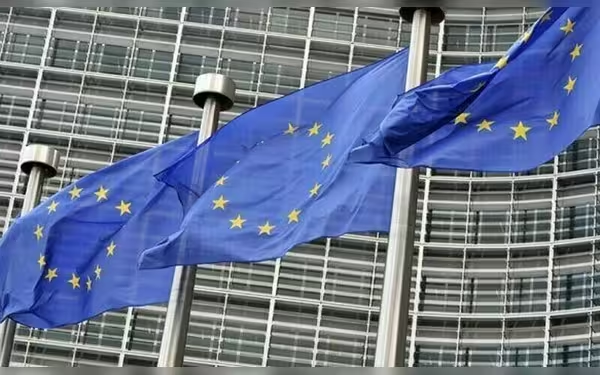Sunday, October 6, 2024 12:38 AM
EU Imposes Tariffs on Chinese Electric Vehicles Amid Trade Tensions
- Ten EU countries approve tariffs on Chinese EVs.
- Germany warns of potential trade war with China.
- China vows retaliation against EU's protectionist measures.
 Image Credits: dawn
Image Credits: dawnTen EU states approve hefty tariffs on Chinese EVs, raising trade tensions with China and prompting potential retaliation.
In a significant move that could reshape the landscape of the automotive industry, ten European Union (EU) countries have approved additional hefty tariffs on electric vehicles (EVs) manufactured in China. This decision comes despite strong opposition from Germany, which has raised concerns about the potential for a trade war with Beijing. The European Commission, which had provisionally approved these tariffs back in June after an inquiry revealed that China’s state aid to its auto manufacturers was unfair, now has the authority to impose these steep tariffs for a period of five years starting from the end of October.
The tariffs, which could reach as high as 35.3 percent, will be added on top of the existing 10 percent duties. Countries such as France, Italy, and Poland have voiced their support for these measures, while Germany and Hungary were among the five nations that voted against them. Twelve other countries, including Sweden and Spain, chose to abstain from the vote. Notably, Spain initially supported the tariffs but later urged Brussels to reconsider its decision.
While the tariffs did not receive backing from a majority of EU states, the opposition was insufficient to block the proposal. To halt the tariffs, at least 15 states representing 65 percent of the bloc’s population would have needed to vote against them. This situation now places the decision-making power in the hands of the European Commission, which oversees trade policy for the EU. Following the vote, the Commission stated that it had "obtained the necessary support for the adoption of tariffs."
China has reacted strongly to this decision, labeling the tariffs as "protectionist" and vowing to retaliate. The Chinese commerce ministry has called on EU states to "return to the right track" by resolving trade frictions through dialogue. In a statement shared by state broadcaster CCTV, it firmly opposed the EU’s actions, describing them as "unfair, non-compliant, and unreasonable protectionist practices."
The imposition of these tariffs has created a rift between France and Germany. France argues that the tariffs are essential to ensure a level playing field for EU car manufacturers competing against their Chinese counterparts. Conversely, Germany, home to major automotive brands like BMW, Volkswagen, and Mercedes, has urged the Commission to reconsider its stance, fearing that the tariffs could provoke a trade war. German Finance Minister Christian Lindner emphasized the need for a "negotiated solution," warning that the EU should not trigger a conflict with China.
China has already indicated that it may retaliate by targeting European products, having opened investigations into imports of European brandy, dairy, and pork. A diplomat noted, "We will face all types of retaliation from China, that’s for sure." Despite attempts to resolve the issue through dialogue, no agreement has been reached that satisfies the EU’s concerns.
The automotive industry itself is divided over the tariffs. Volkswagen has criticized the move, stating that it "is the wrong approach," while BMW has described the vote as "a fatal signal for the European automotive industry." Both companies have called for further discussions to avert a trade conflict. Meanwhile, the US-French-Italian auto group Stellantis has expressed its commitment to "free and fair competition," echoing sentiments from the European Automobile Manufacturers Association.
It is important to note that these additional duties will also apply to vehicles made in China by foreign manufacturers, including Tesla, which faces a tariff of 7.8 percent. As the situation unfolds, the implications of these tariffs could have far-reaching effects on international trade relations and the future of the automotive industry in Europe and beyond.
The approval of these tariffs marks a pivotal moment in EU-China relations, particularly in the context of the rapidly evolving electric vehicle market. As both sides navigate this complex landscape, the potential for a trade war looms large, underscoring the need for dialogue and cooperation to address the underlying issues at play. The outcome of this situation will not only impact manufacturers but also consumers, as the cost of electric vehicles may rise, affecting accessibility and adoption rates across Europe.













